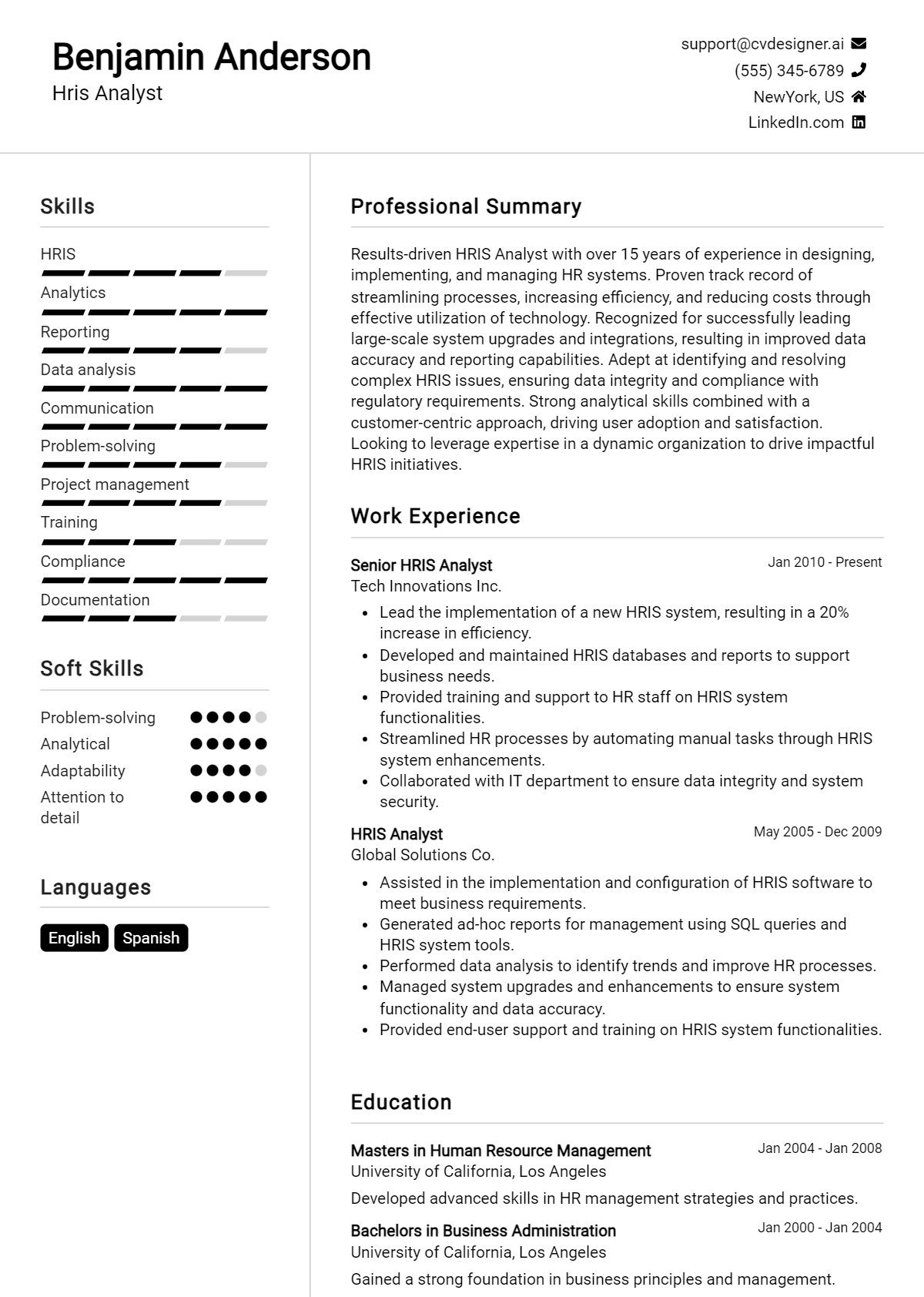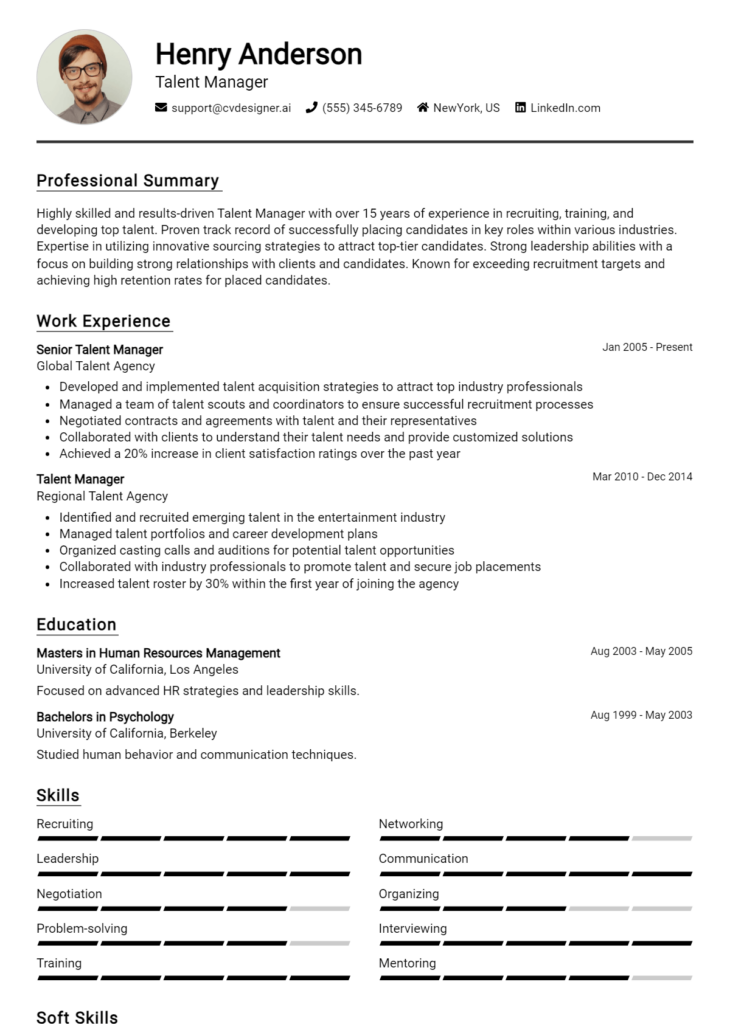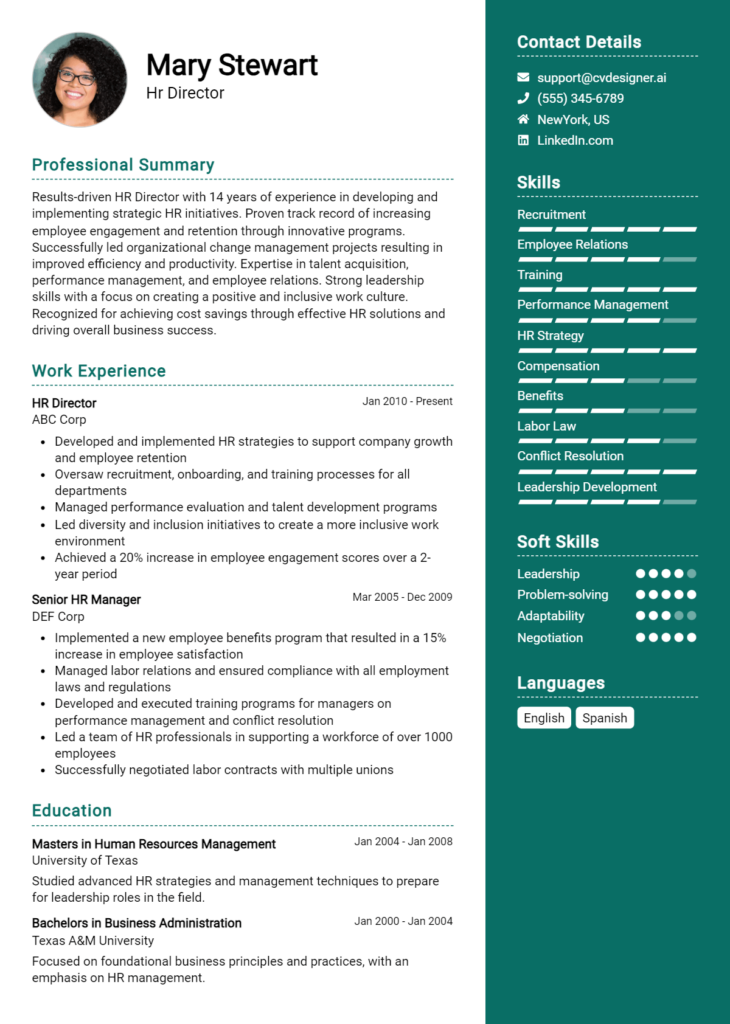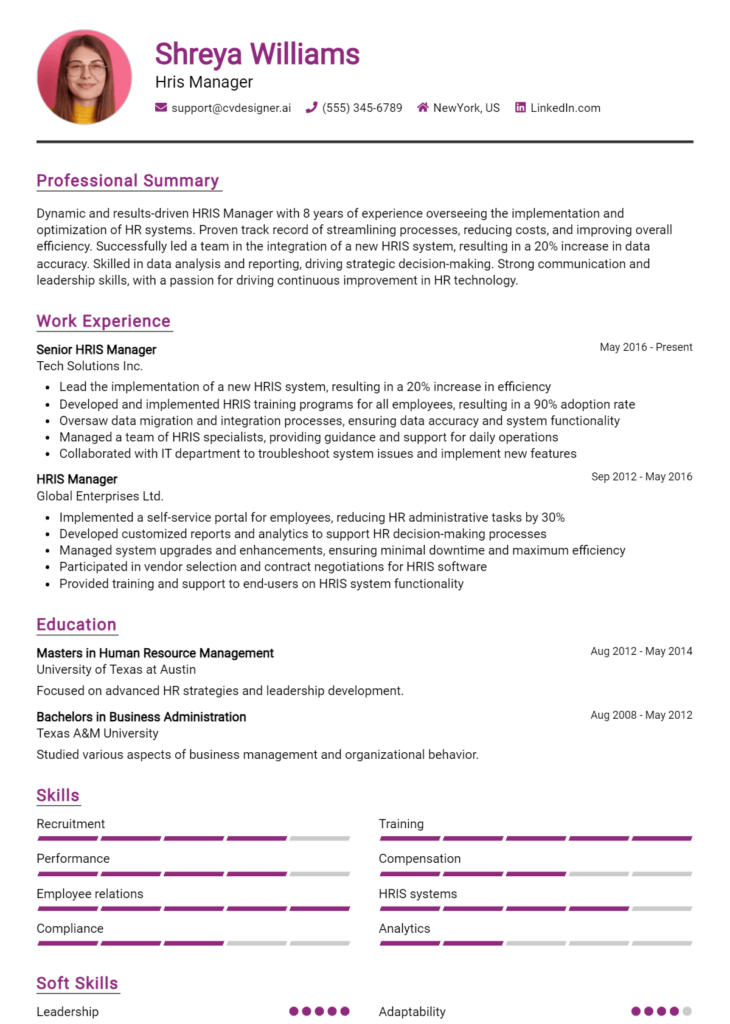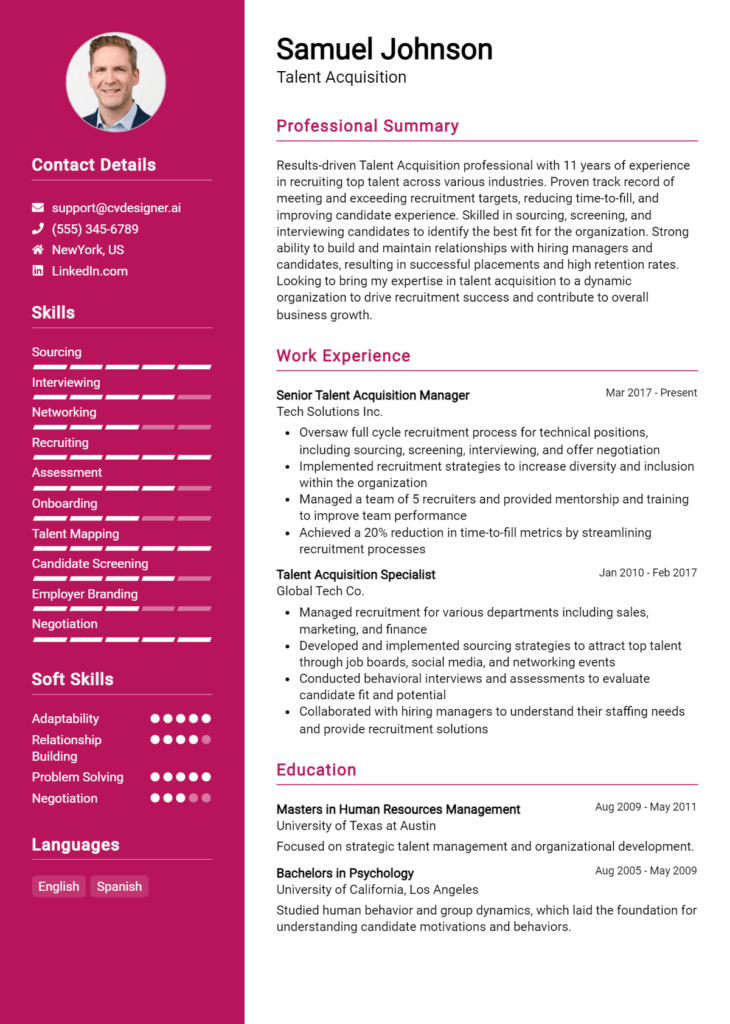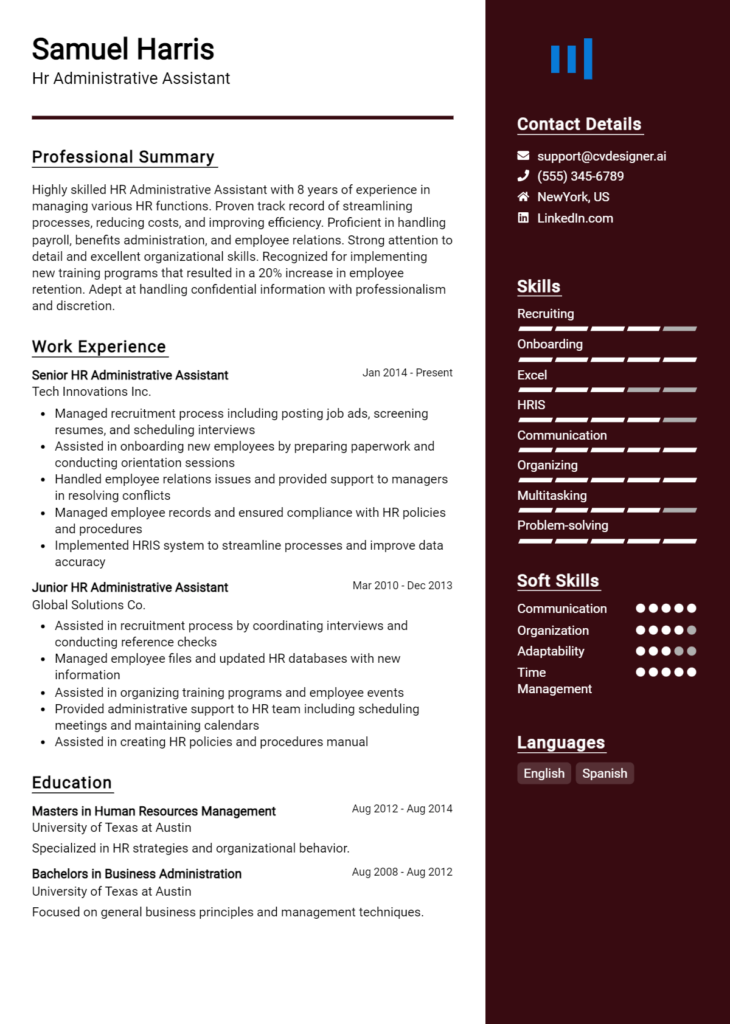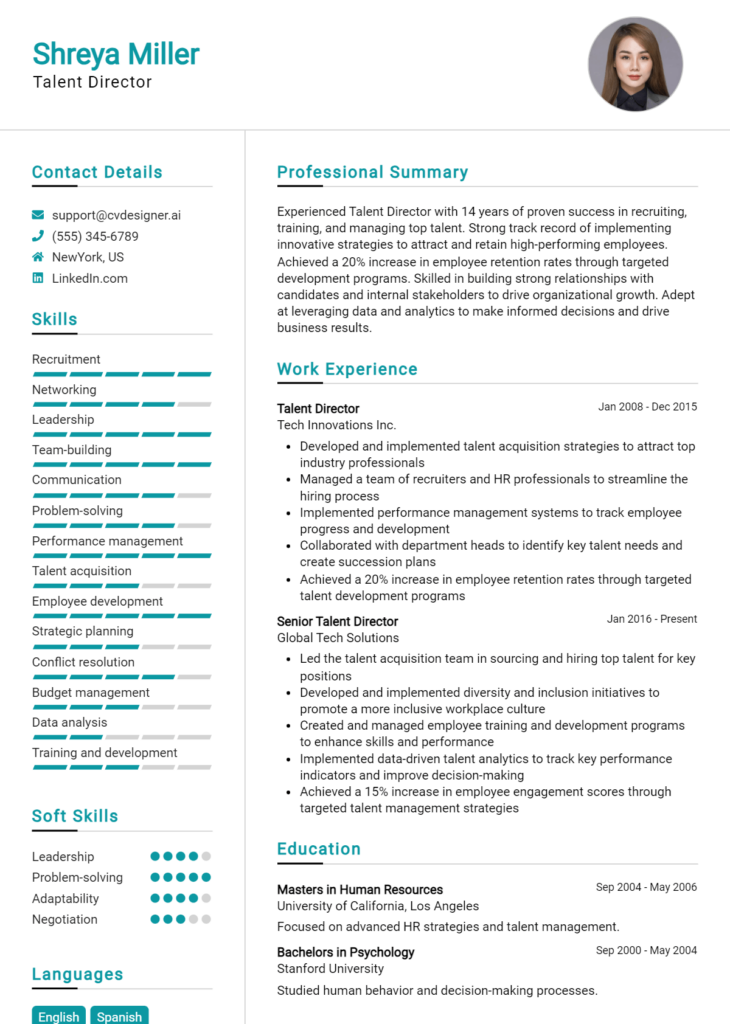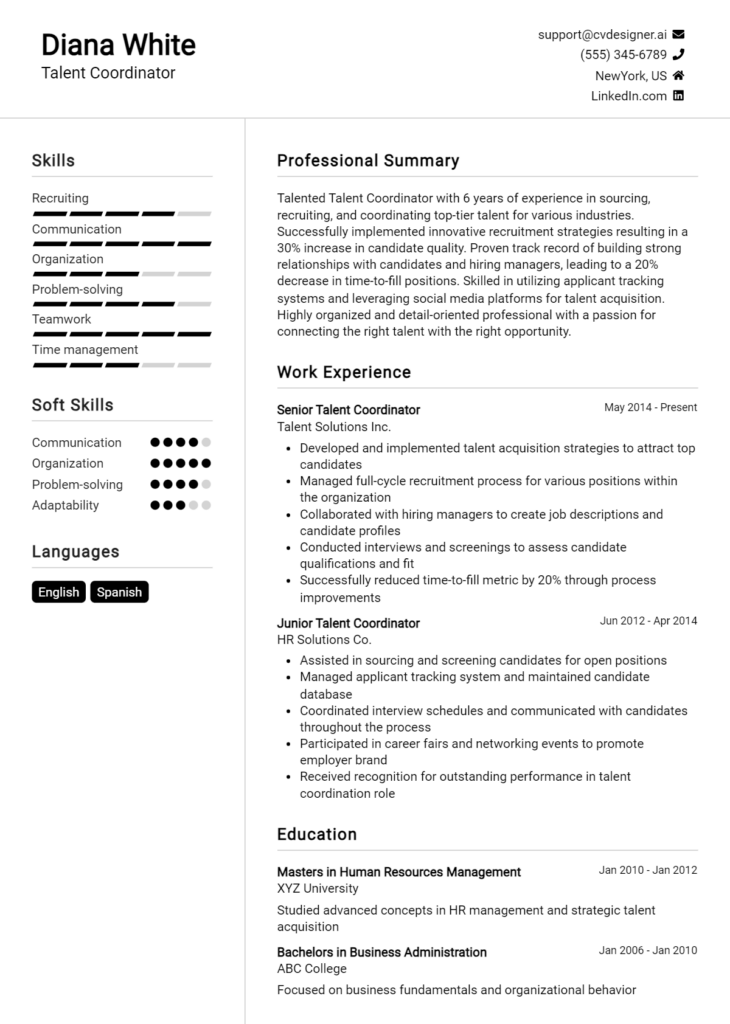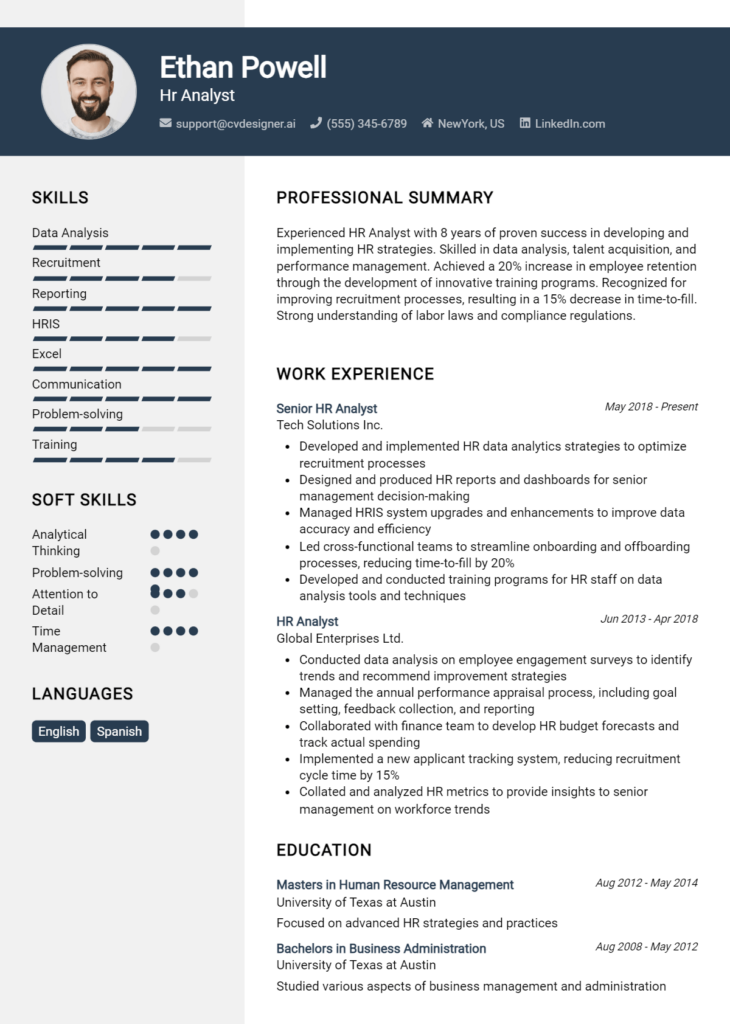Most Popular Hris Analyst Resume Examples
Explore additional Hris Analyst resume samples and guides and see what works for your level of experience or role.
As the backbone of human resource management in any organization, an HRIS Analyst plays a crucial role in ensuring that HR data systems are effectively utilized to streamline operations and enhance decision-making. This position requires a unique blend of technical expertise and analytical skills, making it essential for professionals in this field to present themselves clearly and compellingly through their resumes. A well-crafted resume not only highlights your qualifications but also demonstrates your understanding of the complexities of HRIS, showcasing your potential to contribute to a company's success.
In this comprehensive guide, we will delve into the key aspects of crafting an effective HRIS Analyst resume. You will learn about the specific responsibilities and skills that employers are looking for, as well as the best resume formats to adopt for maximum impact. We will discuss common pitfalls to avoid that may hinder your application, and provide resume examples tailored for various experience levels—from entry-level positions to seasoned professionals. Additionally, we will offer valuable tips on resume writing, including how to select the right resume templates that align with your personal brand and the expectations of the industry. Whether you're just starting your career or looking to advance, this guide will equip you with the tools you need to create a standout resume that captures the attention of hiring managers.
Key Responsibilities and Skills for a HRIS Analyst
As an HRIS Analyst, you play a crucial role in managing and optimizing Human Resource Information Systems. Your key responsibilities typically include:
- System Management: Oversee the HRIS software to ensure it operates efficiently and meets the organization's needs.
- Data Analysis: Analyze HR data to provide insights that inform strategic decision-making and improve HR processes.
- User Support: Provide technical support and training to HR staff and end-users, ensuring they can effectively utilize the HRIS.
- Compliance and Reporting: Ensure the HRIS complies with relevant laws and regulations while generating accurate reports for stakeholders.
- System Updates and Enhancements: Collaborate with IT and other departments to implement system updates, enhancements, and new features as needed.
- Documentation and Training: Create user manuals and training materials to aid in the onboarding of new users and to maintain system knowledge.
Essential skills for a HRIS Analyst include:
- Proficiency in HRIS software (e.g., Workday, SAP SuccessFactors, ADP)
- Strong analytical and problem-solving skills
- Attention to detail
- Excellent communication and interpersonal skills
- Knowledge of HR processes and compliance regulations
- Ability to work collaboratively in a team environment
- Project management skills
- Technical aptitude for system configuration and reporting
Highlighting these skills effectively in your resume’s skills section is vital to catching the attention of hiring managers. Tailoring these responsibilities and skills to align with the specific job description will increase your chances of standing out as a candidate. Additionally, consider how these capabilities can be presented in your CV to showcase your suitability for the HRIS Analyst role, making sure to provide concrete examples of how you have applied these skills in previous positions. This approach not only demonstrates your expertise but also illustrates your understanding of the HRIS landscape and its importance within an organization.
Best Resume Format and Structure for a HRIS Analyst
When crafting a resume for an HRIS Analyst position, it's crucial to select a format that highlights your technical skills, analytical abilities, and relevant experience. Below is a detailed guide on the best resume format and structure for an HRIS Analyst.
Contact Information
Start with your contact information at the top of your resume. This section should include:
- Full name
- Phone number
- Professional email address
- LinkedIn profile URL (optional)
- Location (optional, e.g., city and state)
Professional Summary
Write a concise professional summary that captures your experience and goals. This section should be 2-4 sentences long and highlight your key qualifications, including years of experience, specific HRIS technologies you are proficient in, and any unique skills that make you a strong candidate. For example:
"Detail-oriented HRIS Analyst with over 5 years of experience in optimizing HR systems and enhancing data integrity. Proficient in SAP SuccessFactors and Workday, with a strong background in data analysis and project management. Seeking to leverage expertise to streamline HR operations at [Company Name]."
Work Experience
This section is where you showcase your relevant work history. List your work experience in reverse chronological order (most recent job first). For each position, include:
- Job title
- Company name
- Location (city, state)
- Dates of employment (month and year)
- Bullet points detailing your responsibilities and achievements. Use action verbs and quantify results when possible. For example:
- "Implemented a new HRIS system, reducing data entry errors by 30% and improving reporting efficiency by 40%."
- "Conducted data analysis for employee metrics, providing insights that led to a 15% increase in retention rates."
Education
Include your educational background, listing your most recent degree first. This section should contain:
- Degree type (e.g., Bachelor of Science in Human Resources)
- Major (if applicable)
- University name
- Graduation date (month and year)
- Relevant coursework or honors (if applicable)
Skills
Highlight your technical and soft skills relevant to the HRIS Analyst role. This section should include:
- Technical skills (e.g., HRIS software, data analysis tools, database management)
- Analytical skills (e.g., problem-solving, attention to detail)
- Interpersonal skills (e.g., communication, teamwork)
- Industry-specific knowledge (e.g., compliance regulations, HR best practices)
Certifications
If you have any relevant certifications, list them in this section. Include:
- Certification name (e.g., Certified Human Resources Professional)
- Issuing organization
- Date obtained
- (Optional) Expiration date
Formatting Tips
- Use a clean, professional font (e.g., Arial, Calibri) and keep the font size between 10-12 points for readability.
- Maintain consistent formatting for headings and bullet points.
- Use white space effectively to avoid clutter; ensure margins are at least 0.5 inches.
- Consider using a chronological or combination resume format, as these formats best showcase skill development and career progression.
By adhering to this structured approach, your resume will effectively present your qualifications to potential employers.
When paired with a well-formatted cover letter, your resume can create a cohesive application package. Ensure that your cover letter complements your resume by highlighting specific experiences mentioned in your resume and expanding on them. Use a similar format and style to maintain consistency between the two documents, making your application appear polished and professional.
Writing Tips and Best Practices for a HRIS Analyst Resume
Crafting a compelling resume as an HRIS Analyst requires a strategic approach that highlights your technical skills, analytical abilities, and understanding of human resources systems. To stand out, ensure your resume is well-organized and visually appealing, as a professional look can significantly impact first impressions. Use action verbs to convey your accomplishments dynamically, and quantify your achievements wherever possible to demonstrate the tangible impact you've made in previous roles. Incorporating industry-specific keywords not only helps your resume pass through automated applicant tracking systems but also showcases your familiarity with HRIS terminology and concepts.
- Use strong action verbs like "analyzed," "implemented," and "optimized" to begin each bullet point.
- Quantify your achievements by including metrics, such as "reduced processing time by 30%" or "managed data for over 500 employees."
- Tailor your resume to include industry-specific keywords that align with the job description, such as "data integrity," "system upgrades," or "report generation."
- Highlight relevant technical skills, such as proficiency in HRIS software (e.g., Workday, SAP SuccessFactors), data analysis tools, and SQL.
- Focus on your problem-solving abilities by showcasing examples of how you resolved system issues or improved processes.
- Keep your resume concise and relevant, ideally one to two pages, ensuring that every detail adds value to your application.
- Utilize resume writing tips for formatting advice, bullet point structure, and overall presentation.
- Remember that many of these practices also apply when drafting a cover letter, where you can further elaborate on your skills and experiences in a narrative format.
Common Mistakes to Avoid in a HRIS Analyst Resume
When crafting a resume for the role of an HRIS Analyst, it’s essential to present your skills and experiences clearly and effectively. Many candidates, however, make common mistakes that can undermine their chances of landing an interview. To ensure your resume stands out in a competitive job market, it's crucial to avoid these pitfalls. Here are some frequent errors to steer clear of:
- Overloading the resume with excessive information or irrelevant details.
- Using generic descriptions that don't highlight specific accomplishments or skills.
- Failing to tailor the resume for the specific HRIS Analyst position being applied for.
- Neglecting to use quantifiable achievements to demonstrate the impact of previous work.
- Ignoring formatting best practices, leading to a cluttered or hard-to-read document.
- Omitting key skills or technologies relevant to HRIS, such as specific software or analytical tools.
- Using passive language instead of strong action verbs to describe past roles.
- Not proofreading for spelling or grammar errors, which can create an unprofessional impression.
- Listing job duties rather than emphasizing results and contributions.
- Forgetting to include relevant certifications or training that enhance your qualifications.
To further refine your resume and avoid these errors, consider reviewing common mistakes to avoid in a resume. Additionally, it’s vital to ensure your cover letter is equally polished; familiarize yourself with common cover letter mistakes that should also be avoided to complement your resume effectively.
Sample HRIS Analyst Resumes
As the demand for HRIS Analysts continues to grow, crafting a compelling resume is essential for standing out in the competitive job market. Below are three sample resumes tailored to different experience levels and career paths: an experienced professional, an entry-level candidate, and a career changer. Each example showcases skills, accomplishments, and relevant experiences that highlight the unique qualifications of the candidate. Additionally, readers are encouraged to explore more resume templates for inspiration and check out corresponding cover letter examples to create a comprehensive job application package.
Experienced HRIS Analyst
John Smith
City, State | (123) 456-7890 | john.smith@email.com
Professional Summary
Results-driven HRIS Analyst with over 8 years of experience in analyzing and enhancing HR systems. Proven track record of implementing effective HRIS solutions that improve efficiency and data accuracy. Adept at collaborating with cross-functional teams to deliver innovative solutions in fast-paced environments.
Professional Experience
HRIS Analyst
ABC Corporation, City, State
January 2018 – Present
- Led the implementation of a new HRIS system that increased data accuracy by 30% and reduced processing time by 25%.
- Conducted regular audits and system testing to ensure compliance with HR policies and data integrity.
- Collaborated with IT and HR departments to streamline processes, resulting in a 15% reduction in administrative workload.
HRIS Specialist
XYZ Inc., City, State
June 2015 – December 2017
- Analyzed user requirements and developed comprehensive documentation for HRIS enhancements.
- Provided training and support to over 200 HR staff on system functionalities and best practices.
- Developed analytical reports to help management make data-driven decisions.
Education
Bachelor of Science in Human Resources Management
University of State, City, State
Graduated: May 2015
Skills
- Proficient in SAP SuccessFactors, Workday, and ADP Workforce Now
- Strong analytical and problem-solving skills
- Excellent communication and interpersonal abilities
Entry-Level HRIS Analyst
Emily Johnson
City, State | (234) 567-8901 | emily.johnson@email.com
Professional Summary
Detail-oriented recent graduate with a Bachelor’s degree in Human Resources Management and internship experience in HRIS analysis. Eager to leverage technical and analytical skills to support HR operations and improve system performance in a dynamic organization.
Education
Bachelor of Science in Human Resources Management
University of State, City, State
Graduated: May 2023
Internship Experience
HR Intern
DEF Company, City, State
June 2022 – August 2022
- Assisted in the data migration process to a new HRIS platform, ensuring accuracy and completeness of employee records.
- Conducted user training on HRIS functionalities, receiving positive feedback for clarity and effectiveness.
- Compiled data analyses for HR metrics, contributing to departmental decision-making.
Projects
- Developed a user manual for the HRIS system as part of capstone project, enhancing user experience and training efforts.
Skills
- Familiar with HRIS software such as Workday and BambooHR
- Strong attention to detail and organizational skills
- Proficient in Microsoft Excel and data analysis
Career Changer to HRIS Analyst
Michael Brown
City, State | (345) 678-9012 | michael.brown@email.com
Professional Summary
Dedicated professional with 5 years of experience in IT support and a passion for human resources technology. Seeking to leverage technical background and strong analytical skills to transition into an HRIS Analyst role.
Professional Experience
IT Support Specialist
GHI Technologies, City, State
June 2018 – Present
- Provided technical support for HR software applications, troubleshooting issues and enhancing user experience.
- Collaborated with HR teams to identify system improvements, leading to a 20% increase in operational efficiency.
- Developed training materials and conducted workshops to educate staff on new technologies.
Customer Service Representative
JKL Services, City, State
August 2015 – May 2018
- Enhanced client satisfaction through effective communication and problem resolution.
- Implemented a tracking system for client queries that improved response time by 30%.
Education
Associate Degree in Information Technology
Community College of State, City, State
Graduated: May 2015
Skills
- Knowledgeable in HRIS platforms and data management
- Strong troubleshooting and technical skills
- Excellent communication and team collaboration abilities
Explore more resume templates to find the perfect style for your needs. Don't forget to complement your resume with corresponding cover letter examples for a complete job application package.
Checklist for a HRIS Analyst Resume
- Proofread for Typos and Grammatical Errors: Carefully read through your resume to catch any spelling mistakes or grammatical errors that could detract from your professionalism.
- Check for Consistency in Formatting: Ensure that font sizes, styles, and bullet points are consistent throughout the document. This includes alignment, spacing, and use of bold or italics.
- Tailor the Resume to the Job Description: Review the job posting and incorporate relevant keywords and phrases that align with the specific HRIS Analyst role you are applying for.
- Highlight Relevant Skills and Experience: Make sure to emphasize skills that are critical for an HRIS Analyst, such as data analysis, system implementation, and project management.
- Use Quantifiable Achievements: Where possible, include metrics or outcomes that demonstrate your impact in previous roles, such as improving system efficiency or reducing processing time.
- Include Relevant Certifications and Education: Ensure that any relevant certifications (like HRIS or data management certifications) and degrees are clearly listed and up to date.
- Maintain a Professional Tone: Use a professional tone and avoid any casual language. Your resume should reflect your expertise and seriousness about the position.
- Keep It Concise: Aim for a one-page resume unless you have extensive experience. Be succinct in describing your responsibilities and achievements.
- Get Feedback from Others: Consider having a colleague or mentor review your resume for additional feedback and suggestions.
- Utilize an AI Resume Builder: Make use of an AI resume builder to ensure that all elements of your resume are well-organized and visually appealing.
Remember, a similar checklist can also be applied when creating a CV or cover letter.
Key Takeaways for a HRIS Analyst Resume Guide
As you embark on creating your HRIS Analyst resume, remember that a well-structured and tailored document can significantly enhance your job prospects. Utilize the provided examples and tips to highlight your skills and experience effectively. By focusing on key areas such as technical proficiencies, analytical abilities, and relevant accomplishments, you can craft a compelling resume that stands out to potential employers. To further enhance your application materials, consider downloading a professional template from resume templates or creating a tailored cover letter using our cover letter templates. For those looking to streamline the entire process, our best resume maker is an excellent resource to help you design a polished resume effortlessly. Additionally, applying similar guidelines will prove beneficial when crafting your CV and cover letter. Take the next step towards your career advancement by utilizing these resources and building a strong professional presence.
